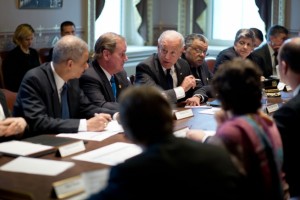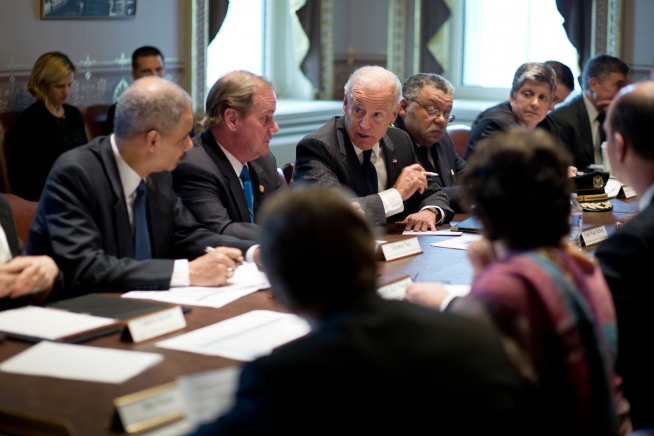
Vice President Joe Biden leads the first meeting to develop policy proposals as part of the Administration’s response to the Newtown shootings and other tragedies. (Official White House Photo by David Lienemann)
Representatives from a group of more than 300 juvenile justice and delinquency prevention organizations at the national, state and local level have met with White House staff and Congressional minority leaders at their invitation in recent weeks to provide evidence-based expertise on ways to reduce gun violence in the country, a coalition leader said.
As tasked by President Barack Obama in the wake of mass shootings at an elementary school last month, Vice-President Joe Biden and his staff have spent the last few weeks meeting with gun-control advocates, pro-gun rights groups and dozens of concerned organizations in preparation for the release of the vice-president’s recommendations for the prevention of gun violence.
According to Politico, Biden indicated today that the president could use an executive order to act on some of his recommendations, which are expected to be made public next week.
On Jan. 4, representatives from the National Juvenile Justice and Delinquency Prevention Coalition and other advocates met with aides to the president and vice-president, including Tonya Robinson, a special assistant to the President on the White House Domestic Policy Council; Evan Ryan, an assistant to Biden; and Mary Lou Leary, the acting director of the Office of Justice Programs, said Nancy Gannon Hornberger, a coalition leader who was present at the meeting. Hornberger also serves as executive director of the D.C.-based Coalition for Juvenile Justice.
Advocates present included Liz Ryan, founder and CEO of the Campaign for Youth Justice; Mark Soler, founder and CEO of the Center for Children’s Law and Policy; and Rey Banks from the National Juvenile Defender Center, Hornberger said.
The group emphasized actions that Congress and the Obama administration could take to address factors that feed violence in communities and recommended a number of evidence-based strategies to help young people and families who are at risk of becoming involved. Such strategies, which have drawn bipartisan support in the past, include comprehensive prevention and intervention measures addressing youth development, behavioral health, mental health and education policy, Hornberger said.
The White House aides said they were meeting with small groups from the field to gain insights into certain questions, Hornberger said. “They were very interested in the recommendations particularly that had to do with administrative leadership and greater coordination and concentration of federal efforts. They recognized too that the White House could advance legislation with the Congress,” she said.
The White House aides were also interested in coordinating and concentrating resources for school and community safety. “We got into a lot of specific evidence-based practices,” Hornberger said. “We also talked a lot about conflict resolution, restorative justice, positive behavior support and mental health strategies.”
On Jan. 3, the day before the “listening session” with White House staff, the coalition released a list of recommendations aimed at President Obama, Biden and Congress. Effective action on its recommendations would require passing legislation, demonstrating administrative leadership and appropriating adequate resources, the coalition pointed out.
The document called upon the Obama administration and Congress to respond to the 26 lives lost at an elementary school in Newtown, Conn., by remembering the many American communities where gun violence remains a common occurrence.
“While the Newtown incident was horrifying and shocking, it represents a small portion of the violence experienced by America’s youth,” the coalition wrote.
Nearly two out of every three children in the United States experience trauma from abuse, crime or violence, the coalition wrote, referring to findings from a report released just two days before the Newtown shootings by a special taskforce appointed by Attorney General Eric Holder to investigate the pervasiveness of violence in children’s lives.
In the wake of the Newtown shootings, some pro-gun rights advocates have called for the government to arm teachers and guards at every public school. Such a response would take entirely the wrong approach, the coalition wrote in its letter to Biden. “It is our view that true safety will not result from having more guns in schools or other places where youth congregate,” they wrote.
Two weeks earlier, on Dec. 19, some of the same advocates were invited to meet with Minority Leader Nancy Pelosi (D-Calif.) and Rep. Bobby Scott (D-Va.), along with nine other House representatives and their staff, to discuss comprehensive solutions to preventing gun violence, Hornberger said, who was there.
“I believe that it was one of many meetings being held in response to Newtown tragedy and in response to the president and vice-president stating very publicly and openly that they were looking for solutions and a comprehensive approach,” Hornberger said.
Others at that meeting with House members included Marian Wright Edelman, the founder and CEO of the Children’s Defense Fund; Ryan of the Campaign for Youth Justice; Soler of the Center for Children’s Law and Policy; and Nick Alexander, the senior policy director for Fight Crime Invest in Kids and Council for a Strong America.
The group discussed prevention and intervention strategies that have been proven through research to help those at risk of becoming involved in violence, as well as cross-sector support for vulnerable families and youth, Hornberger said.
As a result of these meetings, Hornberger said, Reps. Pelosi and Scott will hold a youth violence prevention summit on Jan. 22 to discuss ways to improve community safety and youth development. The summit is open to the public.
Official White House Photo by David Lienemann.
